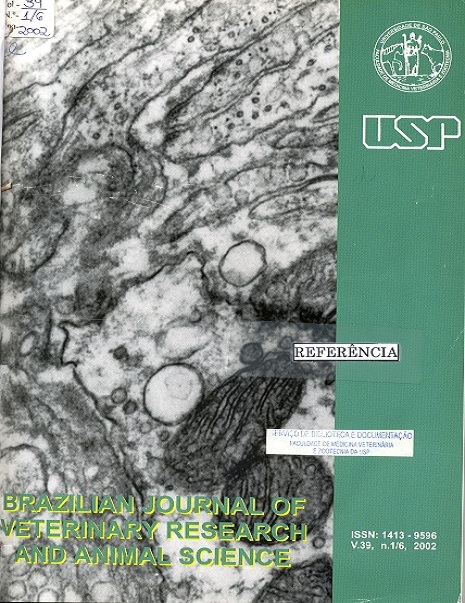Effect of dietary protein intake on calf resilience to Haemonchus placei infection
DOI:
https://doi.org/10.1590/S1413-95962002000500002Keywords:
Haemonchus placei, Protein, DietsAbstract
Twenty, 2-3-month-old worm free male Holstein calves, were assigned to two groups each containing ten animals. Each group was offered one of two diets: High (HP) and Low (LP) protein with 257 and 91 gkg-1 dry matter respectively, balanced for energy and minerals. After an initial period of 4 weeks on the diets, the calves from each group were subdivided into two groups of four and six calves. A trickle infection of 5,000 Haemonchus placei L3 was given twice a week for nine weeks to the sub group of six calves (I). The remaining four calves from each dietary group were used as non-infected control (C). Four weeks after the last infection, all calves were slaughtered and worm burdens counts. Carried out Biochemical determinations, faecal egg counts and body weights were carried out once a week. The HP group had significantly higher mean adult worm burdens (11,900 ± 7,660) when compared with BP (5,450 ± 7,895). Faecal egg counts were higher in the HP than LP group. Despite higher worm burdens, resilience was increased in the HP calves, with higher packed cell volume values as well as body weight when compared with the LP group.Downloads
Download data is not yet available.
Downloads
Published
2002-01-01
Issue
Section
UNDEFINIED
License
The journal content is authorized under the Creative Commons BY-NC-SA license (summary of the license: https://
How to Cite
1.
Louvandini H, Abdalla AL, Coop RL, Mc Manus CM, Gennari SM. Effect of dietary protein intake on calf resilience to Haemonchus placei infection. Braz. J. Vet. Res. Anim. Sci. [Internet]. 2002 Jan. 1 [cited 2026 Jan. 15];39(5):227-32. Available from: https://revistas.usp.br/bjvras/article/view/5952





